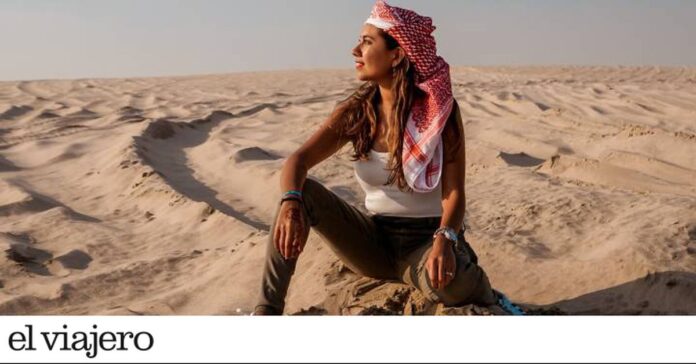“Just do it, and if you feel scared, do it anyway.” When I first heard this phrase, it struck a chord because it’s exactly how I felt when I embarked on my first trip alone: scared, uncertain and doubting my ability to solve the kind of problems that might crop up far from home. As well as my own insecurities, I had to deal with warnings from friends and acquaintances, such as: “Don’t travel alone, it’s risky!” I don’t blame them; stereotypes, the gender gap and the challenges women in particular face in certain countries reinforce this misconception, to the point that we can be tempted to limit what we do and where we go.
Mariel Galan sailing on the Guadeloupe sea after fulfilling her dream of visiting Marie-Galante Island.
But women have traveled alone since time immemorial and adversity has always been a constant. Despite the challenges facing solo women travelers, there’s no shortage of us. According to Statista, an international statistics platform, 70% of the world’s travelers are women and, according to research carried out by Booking.com, 62% of Latin American women have made at least one international trip alone.
My first adventure was in Mexico. Years later, I traveled through the rest of the Americas as well as Europe, Africa, Asia and the Caribbean, all of which has allowed me to compile useful tips for other women wishing to embark on similar solo adventures.
Choose your destination
What do you imagine your first trip alone will consist of? Will it involve walking in a forest, touring an ancient city or discovering a new culture? Give it some thought and assess how feasible it is to undertake, based on your budget, the time available to you and your experience. If you are a first-timer, start by traveling locally or visit countries where you feel comfortable with the language and culture.
Ampersand Travel, an agency specializing in luxury expeditions in Asia and Africa, launched the Wander Women Index 2020 global guide, which listed the best destinations for solo female travelers based on elements such as facilities, safety and women’s rights. According to this index, the six safest countries, in order of mention, are: New Zealand, the Netherlands, France, the United Kingdom, Switzerland and Canada.
Information is power
I believe that knowledge helps to protect me. I spend a lot of time planning and finding out the best places to stay, what the culture is like and how complex the transport system is.
Lodging is key
When it comes to accommodation, I look for options that are centrally located and close to subway stations. My maxim is to read the comments of other travelers. There are many search engines, but among those I use the most are Booking.com, Hoteles.com, Expedia and Airbnb – in case the host lives in the same space, I prefer her to be a woman and check her rating.

M. G.
Keep safe
One of my golden rules is to be as safe as I am in my own city. Here are some of my basic considerations: I never walk alone at night, I don’t fall asleep on any means of transport, whenever I meet someone on my trip I stay in public places and I don’t usually tell them where I’m staying. I also keep my money in more than one place and I keep my family informed of my activities while sharing my location in real time with one of my contacts. Just in case, I hang a whistle on the zipper of my backpack and keep it handy to blow in an emergency. If I want to go out for the night, I plan how to get back to my lodging, try not to carry a bag and keep an eye on my drinks. Finally, I trust my intuition if it’s telling me it’s best to back off, take action or leave.
Make use of technology
Having internet when traveling alone is a must. What works best for me is to buy a sim card from a local company in the country or continent I am visiting. Even though my original number is Mexican, I still keep my WhatsApp contacts. Another option is to buy international cards or find a WiFi hotspot. Apps are also helpful. I use Google Translator, Google Find My Device and Surfshark VPN (a virtual private network through which I can connect securely to public WiFi, preventing theft of my data).
Get insured
Taking out travel insurance is a responsible and preventative measure. There are companies that offer travel assistance, a service that is more complete than international medical insurance.
Sign up for experiences
I’ve found that signing up for travel experiences has been the best way to make friends. I have met people in many countries, but I fondly remember Maria, a Spanish woman who became a great ally after we met on a canyoning excursion in Ecuador, and the group of friends I made in Colombia after taking a vallenato folk music class.
Travel light
Packing light has many advantages: it affords you greater mobility, will stop you from becoming tired and distracted, and save you time. If you’re trying to choose between a backpack or suitcase, I have to say I feel more comfortable with a backpack because it is more practical when walking and taking public transport, though this is a matter of taste. Mine is 50 liters, has plenty of compartments and padded shoulder straps.

M. G.
Throw yourself into local life
Living with a local offers a sense of protection while making me feel closer to the country’s culture. Locals often give me the best tips on how to visit less touristy places and experience more authentic travel. It was thanks to Hector, a fisherman I talked to in Ixtapa Zihuatanejo, that I discovered the best seafood restaurant in Mexico.
The fear of traveling alone was assuaged by actually traveling. With or without fear, there are a growing number of female explorers, who find each other, create community and keep each other strong. To reiterate what I say in my videos: “Travel, you are not alone.”










